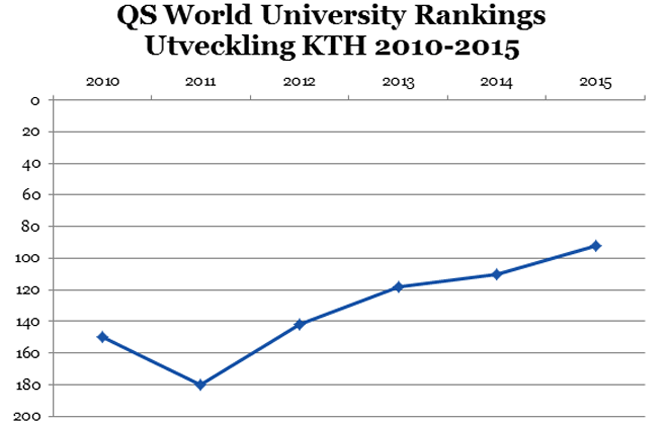
KTH is ranked among world's top 100 universities
KTH Royal Institute of Technology is the 92nd best university in the world, according to the QS World University Rankings released today. The latest ranking represents an advancement of 18 places for the university compared to last year; and it marks the first time KTH has reached the top 100 in any of the four major global rankings.
"Reaching among the hundred best is something that we have worked toward consciously," says KTH Peter Gudmundson. "The placement is proof that KTH's research and education is visible and recognized worldwide. This is obviously very gratifying."
That QS introduced a new way to measure citations per faculty and researchers among five different disciplines has apparently helped KTH along.
The different disciplines are Arts & Humanities, Engineering & Technology, Life Sciences & Medicine, Natural Sciences and Social Sciences & Management.
This takes into account differences in citation frequency between the different subject areas, something that has benefited the university significantly," says Per-Anders Östling, KTH's ranking expert. "Thanks to this result, as well as the successes of the QS Rankings by Subject 2015, KTH international competitiveness is strengthened considerably."
Östling notes that development, for KTH's part, has translated into higher placement.

"Yes, there will be good spirals where better reputation provides higher placement, and vice versa."
KTH has also gotten somewhat better values in the indicator that measures the reputation of teachers and researchers, where the university is ranked 167 in the world. KTH's reputation among international employers has declined slightly, but remains high at 81st place.

A slight decline can be noted in terms of percentage of international students and number of teachers/researchers per student. The effects of tuition fees are clearly visible in the reported facts (based on data from 2014). The proportion of international students at KTH is still relatively high, at over 13 percent.
Here are the results for each indicator, with comparisons to previous years' rankings:
Academic reputation, weighted 40 percent (based on a survey of more than 80,000 replies): 167/2015, 171/2014, 166/2013, 180/2012
Employers reputation, weighted 10 percent (based on survey of more than 40,000 replies): 81/2015, 73/2014, 92/2013, 150/2012
Number of teachers/researchers per student, weighted 20 percent: 196/2015, 160/2014, 167/2013, 168/2012
Number of citations per teacher/researcher, weighted 20 percent (taken from Scopus): 101/2015, 226/2014, 270/2013, 294/2012
Percentage of international lecturers/researchers, weighted 5 per cent,: 143/2015, 161/2014, 118/2013, 153/2012
Percentage of international students, weighted five per cent, location: 315/2015, 229/2014, 136/2013, 64/2012
In the QS Rankings by Faculty, KTH is ranked 36th best in Engineering & Technology, 93rd in Natural Sciences.
Jill Klackenberg